Shannon Lectures, 2016 – Critical Care: Treatment of Body and Mind in Social and Cultural History
Co-convenors: Christine Chisholm and Susanne M. Klausen
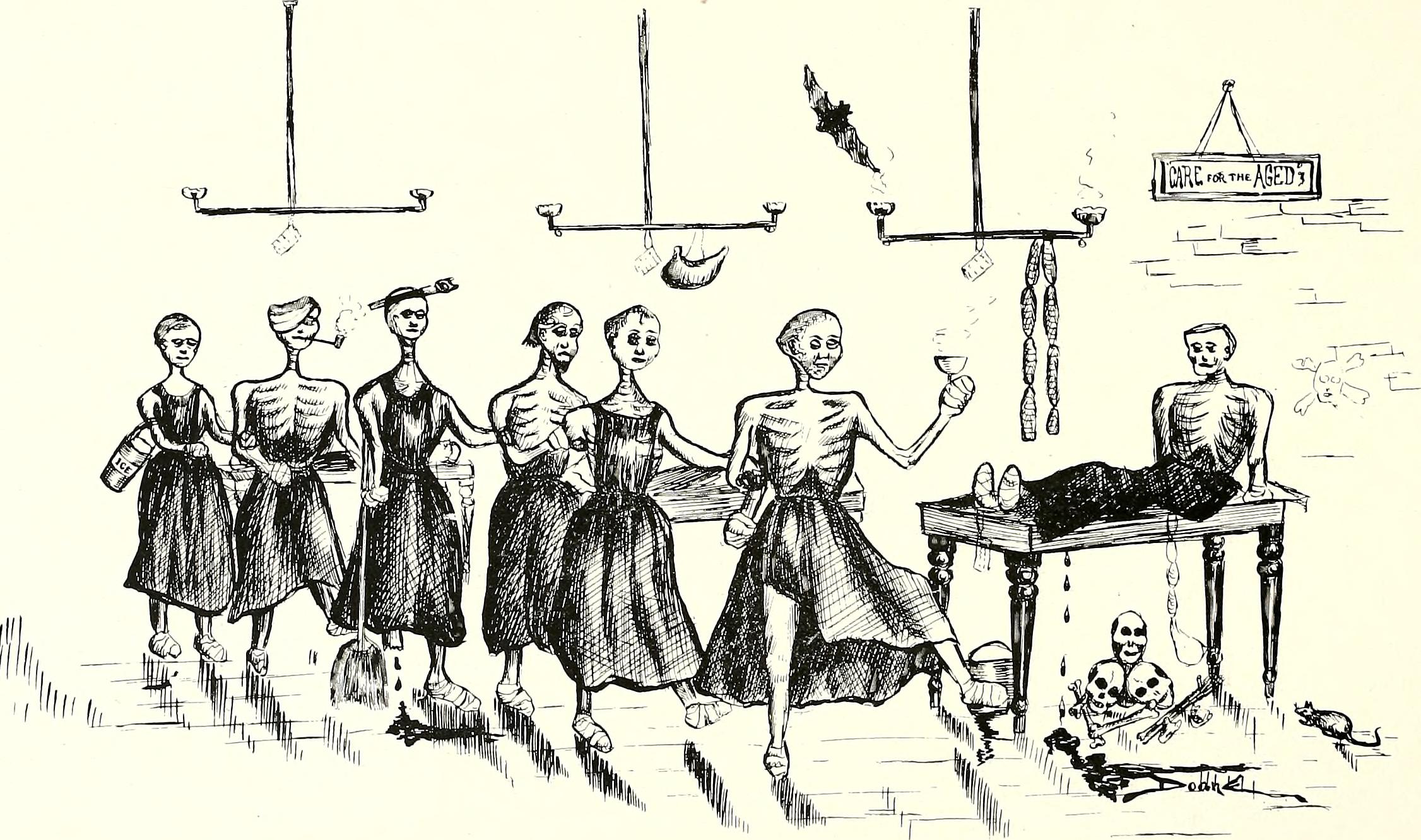
Image from page 235 of The Pulse, Rush Medical College yearbook (1894). Courtesy of Rush University, via Internet Archive Book Images.
About the series:
The History Department’s Shannon Lecture Series for 2016 examined the social, intellectual and cultural history of health, sickness, disease and medicine. The lectures considered cultural perceptions of the body, health and illness and teased out some of the shifting patterns of treatment over the past three hundred years. It is the first lecture series at Carleton University to foreground medical history, reflecting a renewed academic interest in health issues that are currently being pursued in different departments.
Medical history is a complex, multi-faceted field of historical inquiry that touches on almost every other aspect of historical study, including politics, religion, science, gender, race and culture. Scholars in this field are captivated by the many ways it can provide glimpses into the mindsets of people in the past, and by the relevance of past concepts of disease and medicine to current heath care challenges. While one lecture series is unable to capture all the intriguing aspects of this historical field, we were thrilled to welcome four scholars who drew attention to a diverse spectrum of topics, including mental health, disability, First Nations’ experience in the healthcare system, and even death. This public lecture series is made possible by the Shannon Fund, an endowment created by an anonymous friend of the Department of History.
Critical Care: Treatment of Body and Mind in Social and Cultural History
Friday, September 30, 2016
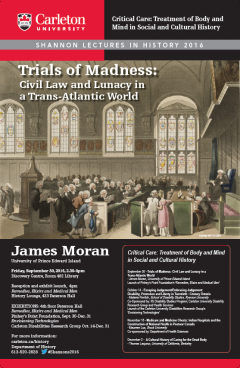 “Trials of Madness: Civil Law and Lunacy in a Trans-Atlantic World During the 18th and 19th Centuries”
“Trials of Madness: Civil Law and Lunacy in a Trans-Atlantic World During the 18th and 19th Centuries”
Dr. James Moran (Department of History, University of Prince Edward Island)
Special Reception Event: During the reception guests had the opportunity to explore the Remedies, Elixirs, and Medical Men exhibit from the Pinhey’s Point Foundation, which explored health care in nineteenth-century March Township and Bytown, drawing on documentation and artifacts from Ottawa’s Pinhey family and their circle. The Hon. Hamnett Pinhey apprenticed in London with a surgeon, and though he never practised the profession he brought a ship apothecary kit and numerous medical books with him to Canada in 1820 and assisted neighbours with medical problems on the frontier in the absence of physicians. The exhibit also surveys the lives of Dr A.J. Christie of Bytown, Pinhey’s son-in-law Dr Hamnett Hill, and Christie’s grandson who had a pharmacy on Sparks Street in the 1870s and an aerated water factory on Queen. These Ottawa personalities and a selection of Pinhey’s 18th and 19th century medical books are set in the context of changing medical knowledge over the course of the 19th century.
The exhibition was housed in Carleton University’s Department of History, 4th floor Paterson Hall, from September through December 2016.

Dr. James Moran
About Dr. Moran
James Moran is an associate professor in the history department at the University of Prince Edward Island. He researches and writes about the history of disease, medicine and mental health. Recent publications include, ‘Travails of Madness: New Jersey, 1800-1870’, in Waltraud Ernst, ed., Work Therapy, Psychiatry and Society, c. 1750 – 2010 (Manchester: Manchester University Press, 2016) and, with Lisa Chilton, ‘Mad Migrants and the Reach of English Civil Law,’ in Marjory Harper ed., The Past and Present of Migration and Mental Health (Basingstoke: Palgrave Macmillan, 2016). He is in the completion stages of a book entitled, Madness on Trial: English Civil Law and Lunacy in trans-Atlantic Context.
Friday, October 14, 2016
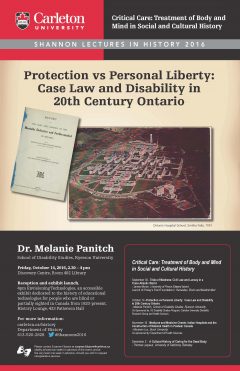 “Protection vs Personal Liberty: Case Law and Disability in 20th Century Ontario”
“Protection vs Personal Liberty: Case Law and Disability in 20th Century Ontario”
Dr. Melanie Panitch (School of Disability Studies, Ryerson University)
Co-sponsored by the Disability Studies Program, Institute of Interdisciplinary Studies
Special Reception Event: During the reception of the October 14th lecture, Carleton University’s Disability Research Group launched Envisioning Technologies, an accessible exhibit dedicated to the history of educational technologies for people who are blind or partially sighted in Canada from 1820-present.
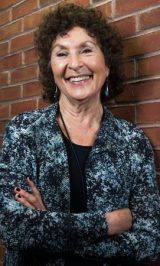
Dr. Melanie Panitch
About Dr. Panitch
Melanie Panitch is an Associate Professor in the School of Disability Studies at Ryerson University and was its founding Director (1999 – 2011.) An activist and advocate for the disability rights movement Dr. Panitch has also co-curated an exhibition on activist disability history in Canada, “Out From Under: Disability, History and Things to Remember,” which was displayed at the Royal Ontario Museum in (2008), Vancouver’s Cultural Olympiad (2010) and which won the City of Toronto Human Rights Award. Her research has cumulated into her book Disability, Mothers and Organization: Accidental Activists, which is a gendered history of activist mothering in the Canadian Association for Community Living.
Abstract
In November 1982, a case came to Perth, in Lanark County Court, as Clark vs Clark.
Justin Clark, was a 21 year old man with cerebral palsy who lived in Rideau Regional Centre, an institution in which he had lived since he was two. He wished to leave but was opposed in this by his father who sought to have him legally declared mentally incompetent and in need of care, supervision and control. Justin, with the help of friends retained a lawyer to represent him in court where he asserted his right to make his own decisions. The case was heard under the Mental Incompetency Act of Ontario.
The case for incompetency was deeply rooted in the inescapable weight and authority of our social and cultural history – eugenics, public policy, legislative reports and scientific classifications – all deemed to be sufficient justification for extreme infringements of personal liberty.
The case for competency asserted alternate framings and analysis. It identified significance in domains previously considered unremarkable and embraced a vision of a life of dignity, liberty and self-determination.
The lecture will probe this case and the Judgement through the lens of the new disability history which seeks to amplify the voices and perspective of people whose place in history has been almost invisible.
Friday, November 18, 2016
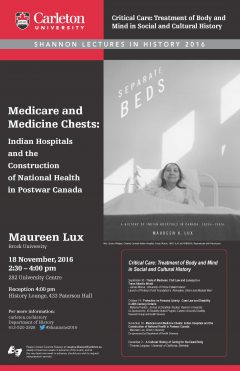 “Medicare and Medicine Chests: Indian Hospitals and the Construction of National Health in Postwar Canada”
“Medicare and Medicine Chests: Indian Hospitals and the Construction of National Health in Postwar Canada”
Dr. Maureen Lux (Department of History, Brock University)
Co-sponsored by the Department of Health Sciences

Dr. Maureen Lux
About Dr. Lux
Maureen Lux teaches history at Brock University. Her latest book, Separate Beds: A History of Indian Hospitals in Canada, 1920s to 1980s was published earlier this year. She is currently collaborating on a book about reproductive politics in 1970s Canada.
Abstract
Two enduring narratives mark the history of health care in Canada in the decades after 1945. Better known is Medicare: often told as a celebrated and progressive story of the path from a hardscrabble provincial plan to the definition of national health that improved health care for Canadians. The other, by contrast, chronicles the continued and continuing health disparities in many, though not all, Aboriginal communities and the seeming intractability of ill-health. I discuss how these contradictory and competing narratives emerged through an analysis of racially segregated hospital care that served the interests of non-Indigenous Canadians, and how Medicare, not the medicine chest, came to define health policy for First Nations people. I explore how it became normal and natural for Canadians to see these intertwined narratives as separate and distinct by examining Indian Health Services and its Indian Hospitals.
Friday, December 2, 2016
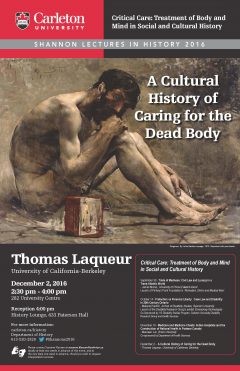 “A Cultural History of Caring for the Dead Body”
“A Cultural History of Caring for the Dead Body”
Dr. Thomas Laqueur (Department of History, UC Berkeley)

Dr. Thomas Laqueur
About Dr. Laqueur
Thomas Laqueur is the Helen Fawcett Distinguished Professor of History at the University of California, Berkeley. He is particularly renowned for his books Making Sex: Body and Gender from the Greeks to Freud and Solitary Sex: A Cultural History of Masturbation. His most recent academic work has culminated in his book The Work of the Dead, which is the winner of the 2016 PROSE Award in European & World History (Association of American Publishers), as well as the 2016 Gold Medal Winner in World History (Independent Publisher Book Awards).
Read more about the 2015 Shannon lecture series, “Performing History: Re-staging the Past“.
Abstract
Proponents of cremation in the late nineteenth century, almost to a person medical men, understood burning the dead in high technology ovens borrowed from the steel industry as a great step forward for progress and civilization. This lecture asks why they thought this was the case and why the materialist view of the body that they advocated had relatively little purchase even among the cultural radicals who embraced cremation. It will look at one particular instance of medical advocacy as a utopian project to rid the dead of their history.